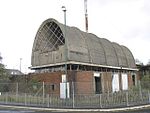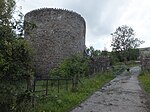Brynmawr
Market towns in WalesPages with Welsh IPATowns in Blaenau GwentWards of Blaenau Gwent

Brynmawr (Welsh for 'big hill'; ; brin-MOUR; Welsh: [brɨnˈmaur]) is a market town, community and electoral ward in Blaenau Gwent, Wales. The town, sometimes cited as the highest town in Wales, is situated at 1,250 to 1,500 feet (380 to 460 m) above sea level at the head of the South Wales Valleys. It grew with the development of the coal mining and iron industries in the early 19th century. Until the reorganisation of local authorities in 1974, Brynmawr was administered as part of the county of Brecknockshire.
Excerpt from the Wikipedia article Brynmawr (License: CC BY-SA 3.0, Authors, Images).Brynmawr
Warwick Road,
Geographical coordinates (GPS) Address Nearby Places Show on map
Geographical coordinates (GPS)
| Latitude | Longitude |
|---|---|
| N 51.796 ° | E -3.183 ° |
Address
Warwick Road
Warwick Road
NP23 4HW , Twyn Cynhordy
Wales, United Kingdom
Open on Google Maps






